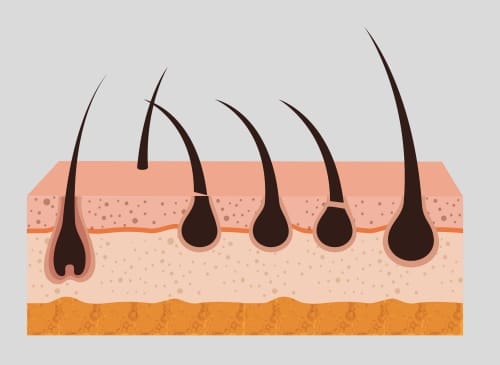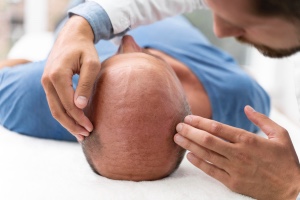Everyone wishes for luscious, silky, and voluminous hair. However, our hair, like all other parts of our bodies, requires nutrients to be healthy. While other factors can influence hair growth, such as age, genes, hormonal effects, and so on, taking the correct vitamins and minerals can help keep them healthy, shiny, and growing.

Here’s a quick rundown of the minerals and vitamins for hair loss:
1. Vitamin A
For growth, your hair requires an adequate supply of vitamin A, also known as retinol. It aids the skin glands in producing an oily substance known as sebum, which moisturizes the scalp and maintains hair health by fighting off radicals that cause your hair to look flat and weighed down. You can include vitamin A-rich animal products such as milk, eggs, cheese, yogurt, oily fish, and vegetables such as carrots and spinach in your diet.
2. Vitamin E
A small study found that vitamin E intake for eight months increased hair growth by 34.5% in people with hair loss. Spinach, almonds, and plant oils such as rapeseed (vegetable oil), sunflower, soya, corn, olive oil, and avocados are high in vitamin E and should be consumed regularly to keep the body’s nutrient levels balanced. Tablets and other supplements for vitamin E are also available on the market, but going natural is a better way to prevent hair loss because these can have negative side effects or even cause hair loss.
3. Vitamin C
Collagen protein is an important component of your hair and this vitamin aids in its formation. Free radicals can sometimes damage and block hair growth, making your hair look dull and aged. Vitamin C is a powerful antioxidant help deter the oxidative stress caused by free radicals and ensures that your hair is growing, strong, and healthy. Fruits such as guavas, oranges, lemons, strawberries, peppers, broccoli, Brussels sprouts, and potatoes are all high in vitamin C.
4. Selenium
It is another antioxidant that removes toxins that can harm and inhibit hair growth. In addition, the mineral is associated with hair formation and is required by the body for thyroid hormone regulation and activation, both of which can lead to hair loss. These hormones and nutrients are linked in some way and are responsible for our hair’s healthy shine. Selenium can be obtained from liver, fish, eggs, whole grains, meat, fish, and nuts, among other foods.
5. Zinc
Hair dryness can also be caused by a lack of zinc in your diet. A hormonal imbalance can occur without zinc, causing hair follicles to shrink. It participates in testosterone metabolism and aids in regulating oil production in the scalp’s sebaceous glands. Meat, legumes, nuts, baked beans, chickpeas, dark chocolate, and other foods can help meet zinc requirements.
If you are suffering from constant hair fall or hair loss, seeking a dermatological treatment is your best bet; it could be due to some disease, vitamin deficiency, hormone imbalance, severe infection, etc. Your doctor would recommend a blood test or a scalp biopsy. Depending on the cause, the doctor may recommend at-home treatments such as minoxidil, laser caps or combs, injections, hair transplant, PRP (platelet-rich plasma), or laser therapy, depending on the severity of the hair loss. Many people do not get enough of these essential nutrients in their daily diets, resulting in deficiencies or the need to take supplements for what is naturally available.
Finally, healthy eating, exercise, and living a stress-free life can help to reduce deficiencies of essential nutrients in the body, which in turn reflect on your hair, resulting in shine, volume, and strength, as well as promoting growth and reducing hair fall. We hope that the minerals and vitamins for hair loss listed above is helpful to you.
Check out our Nuewee Organic Sesamin Gold with Biotin drinks for your hair health. >> Nuewee Organic Sesamin Gold with Biotin

